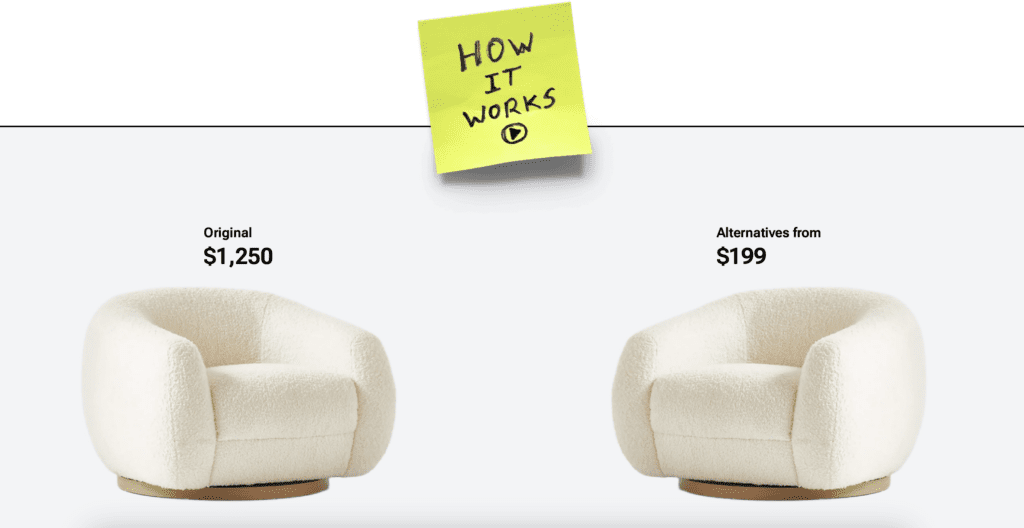Williams-Sonoma, Inc. (“WSI”) has taken aim at Carrot Cart, Inc., the company behind Dupe.com, in a new lawsuit that accuses the platform of engaging in false advertising, unfair competition, and copyright infringement related to its reverse image search tool that helps users find allegedly inferior, lookalike goods for a fraction of the price. The case is the latest example of a big brand taking on a purveyor of duplicate products – or “dupes” – that allegedly profits from offering cheaper, lower-quality imitations of high-end products all while engaging in misleading advertising and infringement.
According to WSI’s complaint, which was filed with the U.S. District Court for the Southern District of New York on August 30, Dupe.com provides consumers with a tool that helps them to find identical or substantially similar products to designer goods. “Dupe.com is essentially a reverse image search that purports to allow users to identify duplicates or ‘dupes’ of furniture and other consumer products, either by going to ‘dupe.com’ and pasting the product’s URL into the search bar or by uploading a picture of the product into the Dupe.com website or app,” WSI alleges in its lawsuit.

The problem, per WSI, is how Dupe.com markets and operates its search tool. Primarily, WSI alleges that Dupe.com markets its tool as capable of helping consumers to find “identical” products to those sold by retailers like Williams-Sonoma, West Elm, and Pottery Barn (all of which are owned by WSI) at a fraction of the cost. Yet, it “often does not live up to [such] representations,” as consumers’ searches “routinely” return “cheaply-made, mass-produced furniture” and other products that are sourced from “unvetted factories” and that are “materially different from the original product in appearance, material, size, dimensions, and/or quality.”
Dupe.com’s marketing is deceptive in other regards, as well, per WSI, which maintains that the company is “‘duping’ its own customers,” including via fabricated social media posts. In furtherance of its advertising activities, WSI claims that Dupe.com has “frequently” presented social media posts “as though they were authentic, organic reviews or testimonials generated by consumers, with statements like ‘my interior designer just showed me this…umm WTF?!’ and ‘furniture insiders put me on to this price hack…woah!,’ when in reality these are not user-generated posts at all, but rather content manufactured by Dupe.com, itself.”
“In addition to misrepresenting the nature of its own product and services,” WSI contends that Dupe.com has also “unlawfully misrepresented WSI’s products and business practices,” namely, WSI’s pricing. WSI argues that Dupe.com has “falsely accused West Elm of engaging in ‘a classic furniture price scam,’ including by selling a chair for over $2,000 while ‘the same’ chair was available for ‘80-90% percent off’ at other sites.” WSI argues that claims like this are off-base because the West Elm chair in question actually costs half the amount that Dupe.com claims and is, in fact, “exclusively manufactured for and sold by WSI.”

Specifically, WSI alleges that Dupe.com has launched a viral marketing campaign claiming that furniture retailers are readily overcharging customers for products that are all manufactured in the same factories and available at much lower prices than those offered by major brands, including those under the WSI umbrella. In an effort to “falsely manufacturing outrage,” WSI points to a video shared by Dupe.com co-founder and CEO Bobby Ghoshal, who stated that he had fallen “for a furniture price scam” and built Dupe.com to help consumers “fight back” against what he portrayed as dishonest practices by furniture companies.
Still yet, WSI accuses Dupe.com of copyright infringement, alleging that Dupe.com unlawfully uses WSI-owned brands’ copyrighted product images in its advertising and on its platform. According to the complaint, “Without authorization, [Dupe.com] downloaded, copied, reproduced, reuploaded, displayed, and/or made derivative works using WSI’s Product WSI claims that Dupe.com’s use of its images without permission adds to the misleading nature of its platform by suggesting that the products featured in the images are available at much lower prices elsewhere.
With the foregoing in mind, WSI is seeking injunctive relief and monetary damages. The retailer is asking the court to prevent Dupe.com from continuing to use its copyrighted images and to stop making false claims about WSI’s products and business practices. WSI is also seeking compensation for lost sales, damage to its reputation, and the profits that Dupe.com has gained through its allegedly misleading advertising.
Dupe.com was not immediately available to comment about the lawsuit.
The case is Williams-Sonoma v. Carrot Cart, Inc., 1:24-cv-06597 (SDNY).














